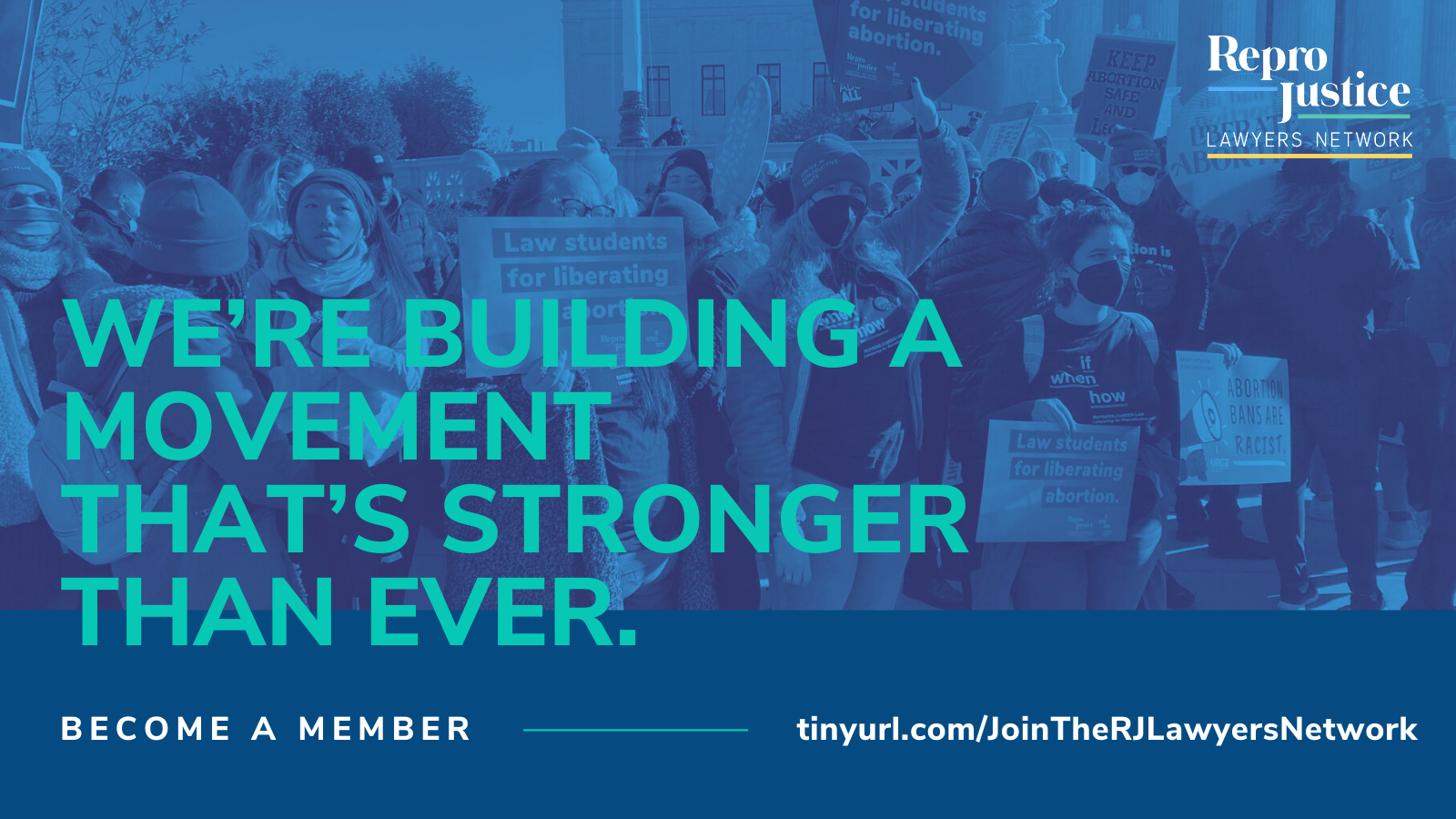By If/When/How
A Q&A with RJ Lawyers Network members and research volunteers Avani Dhillon and Sarah Wiesner
Read on to learn more about their experiences leveraging their legal skills to advance projects to realize reproductive justice.

Research volunteer: Avani Dhillon
Avani earned her J.D. from Albany Law School and an LL.M. in Taxation from Northwestern University School of Law. She has five years of corporate and international tax experience, currently working as General Counsel with the IRS Office of Chief Counsel. Prior to her LL.M, Avani worked as an immigration attorney at a refugee center.
If/When/How: What sparked your interest in reproductive justice?
Avani Dhillon: I had an abortion in Houston, TX and I was scared about the process, the protests, and perceived stigma around it. But the experience that I had was the opposite of my fears and expectations. The ability to have an abortion contributed in my ability to make sure that I can have a kid when I’m mentally, emotionally, and financially secure and stable, because for me, those were important considerations. So I’m grateful for the support that I had and want to give others the freedom of that decision and when I saw restrictive laws like SB8, I realized the extent to which this choice is being threatened and impacted.
If/When/How: Why did you want to apply your legal skills to a reproductive justice research project?
AD: It was the best fit for my skills and personality. There is a power and force to marches in the movement, but I also believe that with that, the legal side helps offer an additional voice and a way to take action. Often laws reflect the voice of the day and it impacts judicial decisions and for me, using the legal voice was the way I could help make an impact.
If/When/How: What was the most rewarding part of your research project experience?
AD: The practical applications and implications that the research has. Research isn’t an abstract thought, but rather how to legally address actual situations faced by pregnant people. So there is a sense that the work you’re doing may have a very real impact.
If/When/How: What’s your advice for other lawyers interested in volunteering their research and legal expertise to the reproductive justice movement?
AD: Ask questions and be open to learning about different aspects of reproductive rights and reproductive justice. The community is small so it’s also good to network and see what means of volunteering is best for you and the organization.

Research volunteer: Sarah Wiesner
Sarah is a lawyer with a background in reproductive health policy, immigration law, and intellectual property. She earned her J.D. from Georgetown Law and a Master’s in Public Health from UC Berkeley. She advises organizations on reproductive health law and policy, and is also on the board of Social Justice Collaborative, which provides legal services to undocumented people in California.
If/When/How: What sparked your interest in reproductive justice?
Sarah Wiesner: I have always strongly believed that we should all have the ability to control our reproductive lives. Everyone who is capable of becoming pregnant is also capable of deciding when is the right time to have a child, if ever. Around the beginning of the Trump presidency, I took a greater interest in reproductive rights, and that was when I discovered reproductive justice. It’s a particularly powerful framework because it also recognizes that how we care for ourselves and our children — including the environment around us, and the resources and opportunities that are available to us — is just as fundamental as access to contraception and abortion for having healthy, happy families. We have a long way to go to achieve reproductive justice for all people in this country, but working with the RJ Lawyers Network is one way to move us closer to that goal.
If/When/How: What was the most rewarding part of your research project experience?
SW: The most rewarding part of my experience with the RJ Lawyers Network has been seeing the real-life impact of a reproductive justice organization. I’ve had the privilege of working with the American Society for Emergency Contraception (ASEC), which supports peer-to-peer networks of college students that provide on-campus access to emergency contraception. It’s inspiring to see the work that they do and how it affects students who wouldn’t otherwise have access to emergency contraception.
If/When/How: Briefly describe your research project.
SW: As part of the RJ Lawyers Network, I was paired with the American Society for Emergency Contraception (ASEC), an organization that works with college students to provide emergency contraception. ASEC had legal questions about some of their activities. With my background in litigation, I was able to research their questions and provide guidance. I also gave a short presentation at their annual conference and put together a one-page Q&A that they can use for easy reference.
If/When/How: What’s your advice for other lawyers interested in volunteering their research and legal expertise to the reproductive justice movement?
SW: If you are passionate about reproductive justice, or interested in diving deeper into RJ issues and learning more, join the RJ Lawyers Network! It’s a group of smart, savvy lawyers who know what matters and are applying their skills to make real-world change. We are at a crucial moment for the future of reproductive justice. Being part of the RJ Lawyers Network is a great way to show your support for the movement and put your skills to good use.
The views and opinions expressed in this blog are those of the author(s) and do not necessarily reflect the views or position of If/When/How. If you like what you read, consider dropping a few bucks in our tip jar or sharing this post on Facebook or Twitter.
